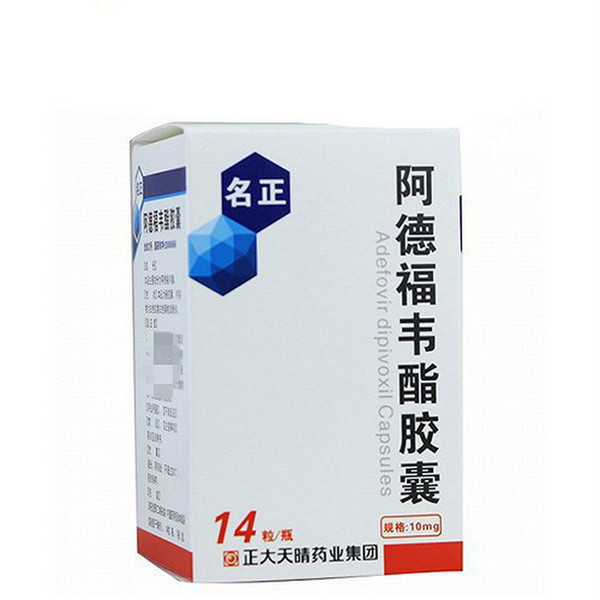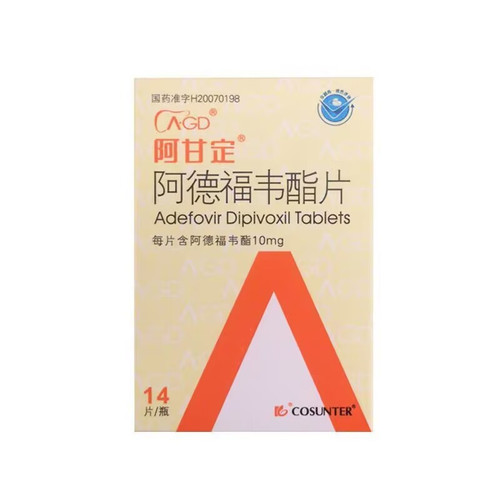Product Overview
[Drug Name]
Generic Name: Adefovir Dipivoxil Capsules
Trade Name: Mingzheng
English Name: Adefovir Dipivoxil Capsules
Chinese Pinyin: Adefuweizhi Jiaonang
[Ingredients]
The main ingredient of this product is adefovir dipivoxil.
[Properties]
This product is a hard capsule containing white or off-white granules or powder.
[Indications]
This product is indicated for the treatment of adult patients with chronic hepatitis B who have evidence of active hepatitis B virus replication, accompanied by persistently elevated serum aminotransferases (ALT or AST), or compensated liver function with active liver histological lesions.
[Dosage and Administration]
This product must be used under the guidance of a physician experienced in the treatment of chronic hepatitis B.
1. The recommended dose for adults (18-65 years) is 10 mg once daily, taken orally before or after meals.
2. The optimal duration of treatment has not been determined. Do not exceed the recommended dose. 3. Patients should regularly monitor hepatitis B biochemical, virological, and serum markers at least every 6 months.
[Adverse Reactions]
Weakness, headache, abdominal pain, nausea, flatulence, diarrhea, and dyspepsia.
[Contraindications]
Adefovir dipivoxil is contraindicated in patients with confirmed hypersensitivity to any of its components.
[Precautions]
1. Patients may experience acute exacerbations of hepatitis B if they discontinue hepatitis B treatment, including adefovir dipivoxil. Therefore, patients who discontinue hepatitis B treatment should closely monitor liver function and, if necessary, restart anti-hepatitis B treatment.
2. Chronic treatment with adefovir dipivoxil can cause nephrotoxicity in patients with renal impairment or potential risk of renal impairment. In these patients, renal function should be closely monitored and the dose adjusted appropriately.
3. All patients should undergo human immunodeficiency virus (HIV) antibody testing before treatment with adefovir dipivoxil. Use of anti-hepatitis B medications, such as adefovir dipivoxil, can affect unknown or untreated HIV in patients with chronic hepatitis B, potentially leading to the development of HIV resistance.
4. Use of nucleoside analogs alone or in combination with other antiretroviral drugs can cause lactic acidosis.
[Use in Special Populations]
Precautions for Children:
The efficacy and safety of adefovir dipivoxil in patients under 18 years of age have not been established. This product should not be used in children and adolescents.
Precautions for Pregnancy and Breastfeeding:
The effects of adefovir dipivoxil on mother-to-child transmission of HBV have not been studied in pregnant women. Therefore, infants should be immunized to prevent hepatitis B virus infection. It is not known whether adefovir is secreted into human breast milk. Breastfeeding women should avoid breastfeeding while using this product.
Precautions for Elderly:
The efficacy and safety of adefovir dipivoxil in patients over 65 years of age have not been established.
[Drug Interactions]
1. Adefovir dipivoxil is rapidly converted to adefovir in the body. At concentrations significantly higher than those observed in vivo (4000-fold), adefovir did not inhibit any of the following common human CYP450 enzymes: CYP1A2, CYP2C9, CYP2C19, CYP2D6, and CYP3A4. Adefovir is not a substrate for these enzymes. However, it is unclear whether adefovir induces CYP450 enzymes.
2. Based on in vitro results and the renal elimination pathway of adefovir, the potential for CYP450-mediated drug interactions with other drugs, either as an inhibitor or substrate, is low. Adefovir is excreted through the kidneys via glomerular filtration and active tubular secretion. Coadministration of 10 mg of adefovir dipivoxil with other drugs secreted through the renal tubules or drugs that alter renal tubular secretion may increase the serum concentrations of adefovir dipivoxil or the coadministered drug. Coadministration of 10 mg of adefovir dipivoxil with 100 mg of lamivudine did not alter the pharmacokinetic properties of either drug. Caution should be exercised when coadministering 10 mg of adefovir dipivoxil with drugs actively secreted by the renal tubules, as the two drugs compete for the same elimination pathway, potentially increasing serum concentrations of adefovir or the coadministered drug.
[Pharmacological Actions]
1. Chronic Toxicity: In animal studies, tubular nephropathy, characterized by histological changes and/or elevated blood urea nitrogen and serum creatinine, was the primary dose-limiting toxicity of adefovir dipivoxil. Nephrotoxicity observed in animal studies occurred at exposures approximately 3 to 10 times that observed at the recommended human therapeutic dose (10 mg/day).
2. Genotoxicity: Adefovir dipivoxil was mutagenic in an in vitro mouse lymphocytoma assay (with and without metabolic activation). In a human peripheral blood lymphocyte assay, adefovir dipivoxil induced chromosomal aberrations without metabolic activation. Adefovir dipivoxil was negative in the mouse micronucleus assay, and adefovir was negative in the Ames test with and without metabolic activation.
3. Reproductive Toxicity: No effects on rat fertility were observed at exposures approximately 19 times the human therapeutic dose. Oral administration of adefovir dipivoxil to rats and rabbits (at exposures approximately 23 and 40 times the human therapeutic dose of 10 mg/day, respectively) did not result in embryotoxicity or teratogenicity. Intravenous administration of adefovir to pregnant rats increased the incidence of embryotoxicity and fetal malformations (systemic edema, sunken eyelids, umbilical hernia, and tail kink) at doses that produce significant maternal toxicity (equivalent to 38 times the human exposure). No adverse effects were observed at intravenous doses equivalent to 12 times the human exposure.
4. Carcinogenicity: Oral administration of adefovir dipivoxil to mice and rats at doses equivalent to 10 and 4 times the human therapeutic dose, respectively, did not result in carcinogenicity.
Storage: Store in a cool, dry place, tightly sealed.
[Specification] 10mg x 14 capsules
[Packaging] Box
[Expiration Period] 24 months
[Approval Number] National Medicine Standard H20060666
[Manufacturer] Company Name: Chia Tai Tianqing Pharmaceutical Group Co., Ltd.







